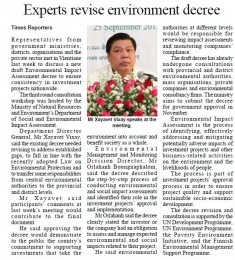Laos: Open For Business, Closed to the Public
The Government of Lao PDR has announced that they intend to approve a new regulation guiding Environmental Impact Assessment procedures in November. However, the draft wording for revisions to the measures outlined in the Prime Minister’s Decree on Environmental Impact Assessment (also known as Decree 112) has yet to be made public. The process to revise standards that guide decision-making on major projects has taken place entirely behind closed doors, limited to government affiliated networks and the private sector.
Community leaders in areas affected by large-scale investment projects, representatives of non-profit associations, academics, members of the scientific community, and wildlife conservation specialists in Laos all have valuable insights about environmental impact assessment processes. Yet, rather than engage with these and diverse other stakeholders who are knowledgeable about the issues critical to the public interest, the government has sidelined these important voices.
Status of Standards In Question
It would be a step backwards if the current standards outlined in Decree 112 are dismantled. The decree has been one of the only limited legal platforms for international environmental and human rights groups to hold proponents of large hydropower dams, industrial plantations and mining accountable. Although the use of this law is curtailed by a serious lack of ways to ensure enforcement, Decree 112 is currently the only legislation that explicitly mandates that all environmental and social impact assessments are made public, shared with affected communities and accessible to all stakeholders.
The decree also explicitly states that it is the right of people who are affected by projects to participate in consultations about the project and to receive timely information, including all environmental and social impact assessments and reports. It also asserts the duty of hydropower developers to organize consultation sessions with affected people at the village level and to have plans to manage affected fisheries, address the downstream situation and to plan a response to the impacts to water basins as a whole. Transboundary impact assessments are also required for all projects that are “likely to create impacts beyond the border.”
Public Input Not Welcome
The unveiling of new environmental impact assessment regulations is an opportunity to demonstrate genuine efforts to create stringent mechanisms that uphold current standards and leverage revenue to ensure sustained financing. However, the process to plan changes to the guidelines to environmental impact assessment has been deeply flawed and lacking in transparency.
Officials from the Department of Environmental and Social Impact Assessment (DESIA) in the Ministry of Natural Resources and Environment (MoNRE) have closed all channels for public input. Despite my own persistent requests of behalf of International Rivers for information about the draft being channeled to DESIA, I have consistently been told that public input is not welcome, and may be considered at a later date.
In contrast, private sector actors - including hydropower developers, mining company executives and plantation business entrepreneurs - have all been given due respect as stakeholders during designated consultation sessions. In whose interests are these reforms being made, especially when the very voices who will be most affected by legal changes and who understand the most about the balance of the environment and livelihoods are shut out of the process?

Throughout the Mekong region, public disclosure and consultation with a broad range of stakeholders is becoming an accepted norm and are required benchmarks for compliance with safeguard standards adopted by the World Bank and Asian Development Bank, performance standards of the International Finance Corporation and equator principles guiding the investments of many large international banks. By shutting out the public, Laos is denying the rights of people to participate in decisions that affect them.
However, responsibility to challenge the systemic marginalization of civil society and impacted communities also must be shared by the international community. Funding for this process has come from Finnish and Swiss overseas development aid and United Nations agencies, all of which publicly champion values of public accountability, transparency, the right to information, the right to participation and the rule of law. When international aid and development agencies remain silent about Laos’ process of shutting out public voices, do they risk becoming complicit in exacerbating exclusion and poverty in the name of ‘national development’?
As the Lao Government proceeds to enact new legislation for environmental impact assessments without addressing the lack of transparency and inclusivity, the international community is placed in an uncomfortable position. Unless bold questions are asked about the need to include public participation, international development and private sector actors risk complicity with a government that fails to be accountable to the public, has rejected standard environmental management principles, and undermines the growing trends in the Mekong region towards good governance and citizen engagement.


